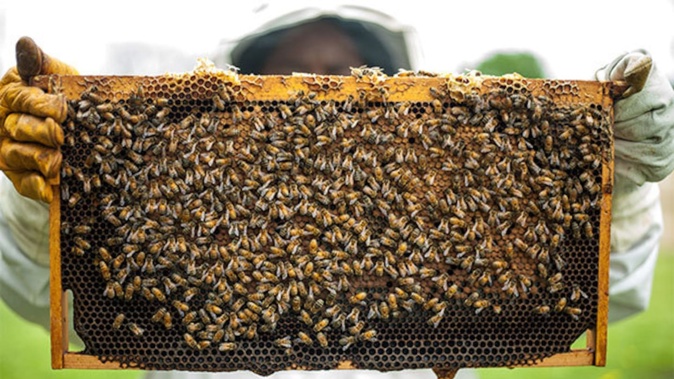
When Elijah Nicholas discovered where his stolen Hino truck was, he did not call the police.
Instead, he took two associates to the address where he knew it to be, and found it “poorly repainted with false registration plates”.
Nicholas also found it had 84 two-box beehives, containing live bees, loaded on to it, and a trailer with a loader was attached to it.
The 30-year-old took his truck, along with the beehives, bees and the trailer with the loader.
Over the following days the owner of the bees, trailer and loader – who was later imprisoned for receiving the stolen truck – contacted Nicholas in a bid to retrieve his property and prevent the bees from dying.
However, Nicholas did not return them. Police then contacted him on “numerous occasions” to try to get the bees back, reiterating that they could die.
Later that month, he turned up at the Te Puke Police Station with 24 beehives.
The bees had died and the trailer was empty and damaged.
The trailer’s electronic brakes and decking timber were damaged, and the spare wheel and vehicle ramps were missing.
Police asked Nicholas to return the remaining 60 beehives, bees, trailer components and loader.
The loader was eventually returned, but not until May 2024, after Nicholas took it in September 2022, and it was also damaged.
At the time it was stolen, the loader was valued at $59,000. When it was returned, it was worth $40,000.
Nicholas went on to plead guilty to a theft charge, but sought a conviction and discharge, given that his truck had been stolen, and that was the catalyst for what then occurred.
But the judge found that would not be an adequate outcome.
At his sentencing, Judge David Cameron noted there were 84 colonies of bees and at $400 per colony, the total value was $33,600.
He said the defendant had ample opportunity to return the items that were not his, including live bees, and made a “callous” decision not to do so.
However, a charge relating to the bees was withdrawn when Nicholas pleaded guilty to the theft charge.
Nicholas was sentenced to six months’ community detention and ordered to pay $32,800 in reparation.
But when he was sentenced, the judge did not know the loader had been returned.
Now, the High Court has found, on appeal, that because the loader had been returned, the amount of reparation was almost full compensation in respect of the loader.
“In those circumstances, I consider that the period of community detention must be reduced,” Justice Michele Wilkinson-Smith said.

High Court Justice Michele Wilkinson-Smith considered the appeal. Photo / Bevan Conley
The sentencing notes recorded the judge’s understanding that the loader remained outstanding.
“... the Judge proceeded on the basis that the level of reparation offered in respect of the loader, which was $19,000, was significantly below the level of actual loss.
“In fact, the reparation represented the actual loss, based on the depreciated value and damage,” Justice Wilkinson-Smith found.
Given the loader was returned, Nicholas’ earlier sentence was quashed and replaced with a sentence of four months’ community detention.
However, Justice Wilkinson-Smith did not agree that there had been any other issues with the sentencing approach taken by Judge Cameron, as Nicholas had argued.
His lawyer, Martin Hine, submitted the judge failed to consider the conduct of the owner of the bees and trailer in stealing the truck in the first place.
However, it was clear in the sentencing notes that the judge had both considered and commented on this.
Hine also submitted that the sentencing judge should not have taken any account of Nicholas’ actions involving the bees and beehives, because the charge relating to that was withdrawn.
“I do not agree with that submission,” Justice Wilkinson-Smith said.
“That was inevitably part of the overall offending, regardless of whether or not there was a separate charge. There is no doubt that factors in a summary of facts which aggravate offending can be taken into account, whether or not those facts were the subject of a separate charge.”
The appeal decision said the overwhelming factor for the sentencing judge was Nicholas’ actions in retaining items that did not belong to him, and continuing to hold them when asked to return them, with the knowledge the livestock could die.
“Judge Cameron did specifically turn his mind to the fact [Nicholas’] vehicle had been stolen from him, but was more influenced by the fact that there were repeated attempts to contact [Nicholas] to recover the property and prevent the bees from dying.”
Justice Wilkinson-Smith said Nicholas’ actions amounted to “vigilante action” by punishing the owner of the bees and trailer, and it was not his place to do so.
She noted the owner was sentenced to imprisonment for receiving Nicholas’ vehicle.
“Vigilante action needs to be discouraged and I find no fault with the approach taken by the sentencing judge,” she said.
Hannah Bartlett is a Tauranga-based Open Justice reporter at NZME. She previously covered court and local government for the Nelson Mail, and before that was a radio reporter at Newstalk ZB.
Take your Radio, Podcasts and Music with you











